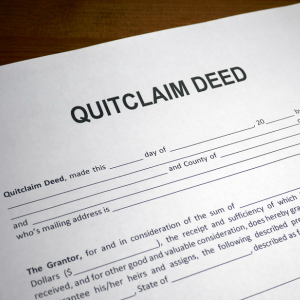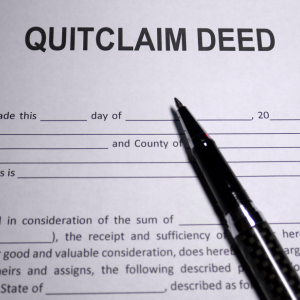
What is a Quitclaim Deed?
Overview of Quitclaim Deeds
A quitclaim deed is a legally binding instrument used in real estate to transfer property ownership. Unlike other deeds, it makes no promises or guarantees on the property’s title status. It merely transfers any interest the grantor may have in the property to the grantee. This sort of deed is commonly utilized when transferring property between family members or to resolve title concerns.
Uses and Limitations
Quitclaim deeds are frequently used to transfer property between spouses or to include a person on a property title. However, they do have restrictions. They make no guarantees about ownership rights or title flaws, which might be risky for the recipient. Because of these limits, quitclaim deeds are typically used when the parties have previously established trust, as they do not guarantee ownership or protect against claims on the property.
Differences Between Quitclaim and Warranty Deeds
The primary distinction between quitclaim deeds and warranty deeds is the level of protection granted. A warranty deed guarantees the property’s title, assuring the grantor’s right to transfer it and the absence of any undiscovered liens or claims. In contrast, a quitclaim deed offers no such commitments; thus, the grantee acquires the interest that the grantor can legally transfer without additional protections.
Kentucky’s Requirements for Quitclaim Deeds
Legal Definition in Kentucky
In Kentucky, a quitclaim deed must comply with certain state real estate document requirements. The deed must also comply with legal standards by explicitly declaring the aim to transfer property ownership without warranties. According to state law, the content and format of a deed must be correct for it to be legitimate.
Necessary Documentation

To complete a quitclaim deed in Kentucky, you must provide certain documents. This comprises a deed form with all necessary information, such as the grantor and grantee’s names, property descriptions, and a clear conveyance statement. Proper document preparation is essential. Once all facts have been completed correctly, the deed must be submitted to the county clerk’s office.
County Clerk’s Role in Filing
The county clerk is an important part of the quitclaim deed filing procedure in Kentucky. The clerk enters the deed into public records to ensure its legitimacy and availability for future reference. The filing process includes verifying the document to ensure it fulfills legal standards, following which the deed is added to the county’s official records. This phase is critical for identifying the property’s ownership transfer and ensuring transparency and accuracy in real estate transactions.
How to Prepare a Quitclaim Deed in Kentucky
A quitclaim deed is used to transfer property interest in Kentucky. This guide will show you how to create one, focusing on document preparation, transfer instructions, and legal issues.
Steps to Prepare the Document

Follow these key steps to create a valid quitclaim deed:
- Gather Required Information: Collect details such as the current owner’s and the grantee’s names, along with the property’s legal description.
- Fill Out the Kentucky Quitclaim Deed Form: To avoid issues, use the correct form and enter the information accurately.
- Review Legal Requirements: Learn about state laws to meet all criteria before notarization.
Required Information and Details
When preparing your quitclaim deed, you’ll need:
- Property Description: Provide the legal description of the property’s title.
- Current Owner Details: Include the owner’s full name and contact info transferring the interest.
- Grantee Information: Name the person receiving the interest.
- Legal Description: Accurately describe the property based on local records.
- Filing Requirements: Know what is needed to file quitclaim deeds in Kentucky to prevent delays.
Legal Considerations and Notarization
Understand the legal aspects involved in creating a quitclaim deed:
- Legal Requirements: Consulting a real estate attorney can help ensure compliance with property laws in Kentucky.
- Notarization: Have the deed signed in front of a notary public. Some areas may also require witnesses.
Filing a Quitclaim Deed with the County Clerk
Once the quitclaim deed has been completed and notarized, file it with the county clerk’s office to make it a public record. Here are the filing instructions and prerequisites.
How to File the Completed Deed

To submit your quitclaim deed, follow these steps:
- Visit the County Clerk’s Office: Take your completed and notarized deed to the right county clerk’s office.
- Deed Submission: Ensure all copies match county records when submitting.
- Document Filing: Confirm that your deed is recorded in the public records.
Filing Fees and Payment Methods
Know what fees and payment methods apply:
- Filing Fees: Check with your county clerk for the exact fees.
- Payment Options: Many offices accept cash, checks, and credit cards.
Timeline for Processing and Filing
The time it takes to process and file can vary:
- Processing Time: Typically, deeds are processed within a few weeks.
- Filing Deadlines: Note any deadlines that might affect filing validity.
- Public Record Access: After filing, the deed is accessible as a public record, protecting both parties legally.
Common Mistakes and How to Avoid Them
Errors in Completing the Form
When completing a quitclaim deed form, it is critical to pay attention to detail. Mistakes in completing the paperwork might lead to problems with real estate transfers and legal documentation. Incorrect names, dates, and property descriptions are all common problems. Before submitting the form, double-check all information to ensure its accuracy. Consulting with a specialist can help ensure that the form is completed appropriately.
Missing Signatures or Notarization

A common error in legal forms is a lack of signatures or notarization. To meet filing requirements, all parties must sign the document in the presence of a notary public. The document may be rendered invalid if any of these components are missing. Before applying, ensure that all signatures are present and properly notarized.
Incorrect Property Descriptions
A correct property description in the deed is required for real estate transactions. An improper description may result in title issues and legal disputes. Check that the legal description reflects the property’s official documents, including boundaries and other information. Check this information against county records or consult a professional to avoid future issues.
Importance of Professional Assistance
When to Consult a Real Estate Attorney

Knowing when to seek counsel from a real estate attorney can significantly impact the outcome of a property deal. A real estate attorney can provide essential insight and advice in complex circumstances, such as property boundary disputes or ambiguous legal documentation. Their knowledge of property law allows them to manage the procedure effectively and correctly.
Benefits of Legal Advice and Review
The advantages of seeking legal counsel and analyzing your real estate documents are enormous. Professional counsel assures compliance with applicable regulations and enhances document correctness, lowering the likelihood of future legal issues. Working with skilled specialists lets you discover possible concerns before they escalate, giving you peace of mind throughout your real estate transactions.
Implications of Filing a Quitclaim Deed
Filing a quitclaim deed can substantially impact property ownership, taxes, mortgages, and insurance policies. This section discusses how these elements interact, specifically in Kentucky real estate.
Impact on Property Ownership

A quitclaim deed transfers property rights from the present owner to another person. Unlike warranty deeds, quitclaim deeds do not guarantee that the title is free of claims or encumbrances. This technique is frequently utilized when there is reciprocal confidence, such as between family members. It is critical to realize that legal ownership changes, along with the associated rights and duties.
Tax Considerations in Kentucky
In Kentucky, a quitclaim deed might affect your tax situation. While it may not immediately affect property tax responsibilities, consulting a tax adviser is recommended to fully understand real estate tax changes. The state has particular requirements for quitclaim deeds that affect purchasers and sellers, so understanding tax implications helps avoid unexpected liabilities.
Effects on Mortgage and Title Insurance
The use of a quitclaim deed to transfer property may impact existing mortgage agreements. Lenders are usually notified of these modifications, as the deed will not modify the borrower’s obligations but may affect refinancing options. Furthermore, title insurance policies can be checked to assess their coverage following the transfer. Discussing these issues with financial institutions and insurance is critical to avoid complications.
Securing Proper Records and Proof
Proper documentation is critical for establishing proof of ownership. Once a quitclaim deed has been filed, it must be recorded in county records to ensure a verifiable public record.
How to Obtain a Copy of the Filed Deed

Contact the Kentucky County Clerk’s Office to obtain a copy of the filed deed. Keeping a copy of the real estate documents is useful for your records because it provides legal proof of ownership. Checking public documents helps to protect this document and supports ownership claims.
Verifying the Recording with County Records
Verifying the recorded deed guarantees that it has been correctly put into the county records. This includes checking official records at the county clerk’s office. Confirming the details of the filed deed authenticates it and ensures that the property is properly registered. Public records must be reviewed regularly to ensure proper real estate data.
Understanding these characteristics allows people engaged in a quitclaim deed transaction to handle the Kentucky real estate process better.
Ensuring Compliance with Kentucky Law
Key Legal References and Statutes
To navigate Kentucky property laws, you must first comprehend the legal statutes. Preparing legal paperwork precisely and adhering to Kentucky filing deadlines is critical. Always consult the most recent legal materials to comply with current legislation.
Understanding Local Ordinances

When dealing with real estate in Kentucky, it is critical to be informed of local laws. These rules can vary widely depending on the region and impact properties’ use or development. The county clerk’s office provides in-depth information on these ordinances. Consulting a real estate attorney can provide further information and guarantee that all legal criteria are met.
Resources for Further Information and Assistance
Access to public documents in Kentucky is critical for buyers seeking complete legal and historical property information. Correctly filling out legal papers is important to successful transactions. Understanding the real estate transfer tax will also help with financial planning for future property acquisitions.
Contact and Support Information
How to Reach Kentucky County Clerks
To access land records in Kentucky, you must first contact the county clerk’s office. These offices keep public land records and can provide information on deed recording fees and other services. You can seek assistance from their official websites or by visiting them in person.
Accessing Legal Help and Real Estate Services
A real estate attorney can assist with legal paperwork during property purchases. Whether it is estate planning or satisfying legal requirements in Kentucky, experienced counsel assures a smooth process and adherence to state regulations. Resources supplied by skilled specialists can assist you with the paperwork process.
FAQs:
What is the process of filing a quitclaim deed in Kentucky?
To file a quitclaim deed in Kentucky, get the current deed from the county clerk’s office. Fill out a Kentucky quitclaim deed form with the necessary details. Ensure that all parties sign it and that a notary public notarizes it. Submit the completed deed and the required filing fee to the county clerk’s office.
How can I upload or scan my quitclaim deed document for filing?
You can scan your completed quitclaim deed using a digital scanner and save it on your computer. Many county offices accept online submissions, so check your local county clerk’s website for instructions on uploading documents.
Is there a specific fee associated with filing a quitclaim deed in Kentucky?
Yes, there is usually a fee to file a quitclaim deed in Kentucky. The fee varies by county, so contact the county clerk’s office for exact details. Include payment when you submit the deed for recording.
What is the difference between a quitclaim deed and a warranty deed?
A quitclaim deed transfers the property title without guaranteeing a clear title, while a warranty deed guarantees that the grantor holds a clear title. Consider your transfer purpose when choosing between these deeds.
Why might someone choose a quitclaim deed over other types of deeds?
Quitclaim deeds are often used to transfer property between family members, correct a title, or when ownership rights aren’t in question. They are simpler and typically less expensive than warranty deeds, making them suitable for certain transactions.
What are some common pitfalls in executing a quitclaim deed?
Common issues include incomplete forms, missing signatures, and lack of notarization. To prevent complications, verify all details and consult legal guidance if needed.
Can I find a quitclaim deed template online for Kentucky?
Yes, quitclaim deed templates for Kentucky are available online. Ensure the template complies with Kentucky state laws and includes all necessary provisions. Legal advice may help select an appropriate template.
What should I do to correct a property title with a quitclaim deed?
To correct a property title, draft a new quitclaim deed reflecting the desired change. You may need to consult a legal professional to ensure the corrections are legally binding and properly recorded with the county clerk’s office.
Key Insights
- Upload or scan your document to simplify the legal document processing of Kentucky quitclaim deeds.
- Before preparing the Kentucky quitclaim deed form, obtain the current deed from the county clerk’s office.
- Submit the signed, completed deed along with the required fee at the appropriate county office.
- Accurately prepare legal forms for property title changes and family property transfers.
- Understand the differences between quitclaim deeds and special warranty deeds and how they affect joint tenancy transfers and property ownership verification.
- Use online legal documentation guides and quitclaim deed FAQs to help with filing deadlines in Kentucky.
- Online deed filing in Kentucky speeds up legal paperwork for land records and reduces quitclaim deed costs.
- Review a quitclaim deed sample to become familiar with legal documents and ensure smooth property title changes.
- Legal disclaimers and transparency indicate no affiliation with legal practices in this informational context.
Learn more about how to sell a house in Kentucky by reading on. The insights shared here are relevant throughout the state, including cities like Louisville, Lexington, Bowling Green, Owensboro, Covington, Georgetown, and surrounding areas. Whether you’re navigating the selling process for the first time or are experienced, these tips can help guide you. Additionally, if you’re looking for a hassle-free option, we buy houses in Kentucky and can provide you with a fast, fair offer. For more personalized assistance or to explore your options, don’t hesitate to Contact Us at 859-964-1275.
Get An Offer Today, No realtors, fees, or repairs.
We will buy your house in any condition. Cash offers within 48 hours!
"*" indicates required fields


